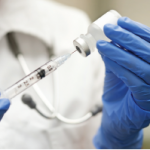Findings such as these leave it up to a clinician’s judgment to determine whether the benefit of the vaccination is worth the heightened risk of flare, Dr. Schwartz said.
Dr. Schwartz also reminded the rheumatologists in the room about the widespread risk of flu. Although patients may say, “I never get the flu,” and think they don’t need the vaccine, the reality is 43 million symptomatic flu cases occurred in the U.S. in the 2017–2018 season, as well as almost a million hospitalizations and about 80,000 deaths. Patients need to know “there’s a good chance [they’re] going to be affected by this,” he said.
Rheumatology patients who get the flu would benefit from treatment with oseltamivir even if symptom onset is longer than two days—an exception to the rule of thumb that treatment is not beneficial after 48 hours.
“You’re still going to reduce the risk of having a bad outcome” in these particularly vulnerable patients, Dr. Schwartz said.
For patients with a family member with flu and with whom they’ve had close contact, a preventive dose of oseltamivir once a day rather than twice a day can be beneficial even if they’ve shown no symptoms.
Zoster Vaccinations
Additionally, zoster vaccinations may become more feasible for rheumatology patients, Dr. Schwartz said.
An inactivated zoster vaccine, Shingrix, is now available, making it a more appealing option for immunosuppressed patients than the live version. The original clinical trials excluded patients with autoimmune diseases and organ transplant recipients. But a recent, randomized, controlled trial tested this by enrolling 264 kidney transplant recipients, and the results suggest it is safe and effective in that population.2
Patients in the trial were on a calcineurin inhibitor, steroids and mycophenolate mofetil. Immune responses were higher among those randomized to receive the vaccine, compared with placebo. Local adverse events were higher, but renal function changes, rejections and potential immune-mediated diseases were no more common in the treatment group than in the placebo group.
“I think the signals are really showing that this may be fine and would be efficacious,” Dr. Schwartz said. “I’m really excited about this vaccine.”
He also emphasized the importance of the HPV vaccine. Immunosuppression promotes persistence of the human papillomavirus, which is linked to a variety of cancers.
“Vaccination can reduce these risks, particularly if it’s given before one acquires HPV,” he said. Dr. Schwartz recommends all rheumatology patients under the age of 27 get the HPV vaccine.


